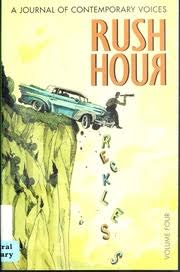Teen Read Week – Rush Hour
Listen to the Recess! Clip
| Author | Ramona Caponegro |
| Air Date | 10/18/2005 |

Teen Read Week Transcript
“Get real.” How many times have you heard a sullen or sarcastic teenager utter these words? Well, the Young Adult Library Services Association is currently giving this popular teen phrase a more enthusiastic interpretation, making “Get REAL @ your library” this year’s theme for Teen Read Week. While the theme is designed to foster teens’ interest in reading nonfiction, the organizers of Teen Read Week emphasize the importance of encouraging teenagers to read, “no matter what the theme.”1
This promotion of all types of literature for young adults is central to Rush Hour: A Journal of Contemporary Voices, which includes a mix of essays, short stories, poetry, drama, and drawings in each of its issues. Every issue of the journal revolves around a specific theme, like the already released volumes entitled Sin, Bad Boys, and Face, and the forthcoming volumes Reckless and Good Girls, but each issue addresses crucial, real life situations and concerns that many teens today encounter. And these questions and dilemmas are thoughtfully articulated and examined by well-known authors and artists, like K.L. Going, Jacqueline Woodson, David Lubar, and William Steig, as well as by newcomers to the world of young adult fiction.
As Michael Cart, the editor of the journal, states, “I believe that teens of all ages require a literature that addresses their unique and specific life needs. The Rush Hour reader is the crossover consumer, and I’m interested in including sophisticated content that will appeal to readers in both high school AND college.” In order to engage this audience, the journal explores a wide range of difficult psychological topics, like the need to come to terms with one’s ethnic and sexual identity, the motivations behind self-destructive behavior, and the harm that we are all capable of doing to others, even unintentionally. The journal also addresses many of the perennial problems of teens, like fights with parents and siblings, peer pressure, and self-consciousness. Yet, no matter what subject is being considered, Rush Hour engages the issue’s complexity, refrains from extending formulaic solutions, and promotes reflection of both self and society. Because of this open-ended style and its thought-provoking content, Rush Hour: A Journal of Contemporary Voices offers a unique reading opportunity for older teens who are ready to “get real” about the contemporary society in which they live.
Notes:
1 “Frequently Asked Questions About Teen Read Week.” American Library Association. http://www.ala.org/ala/yalsa/teenreading/trw/trw2005/faq.htm